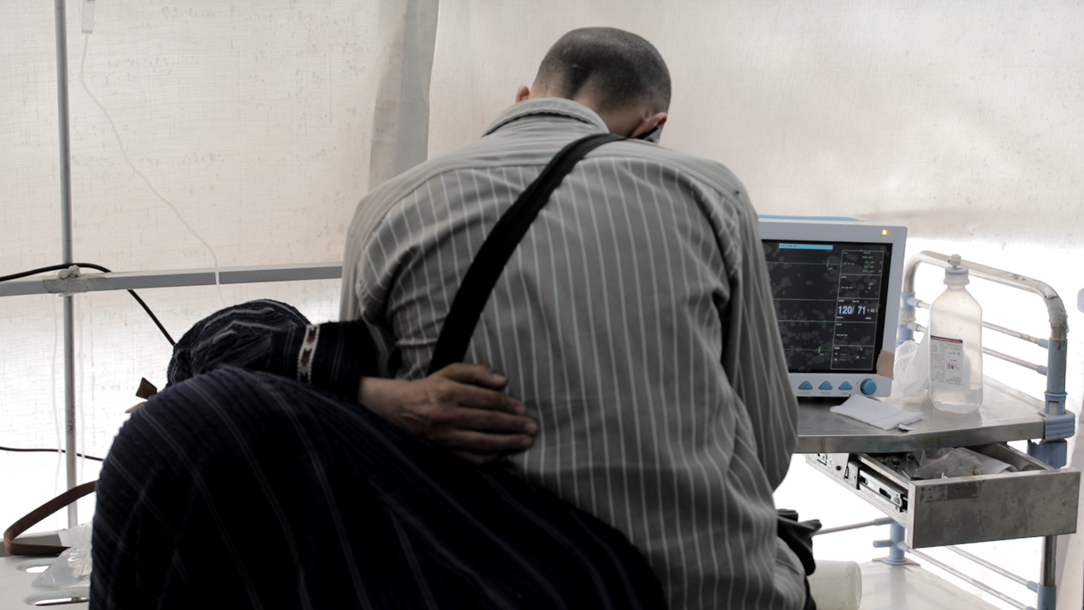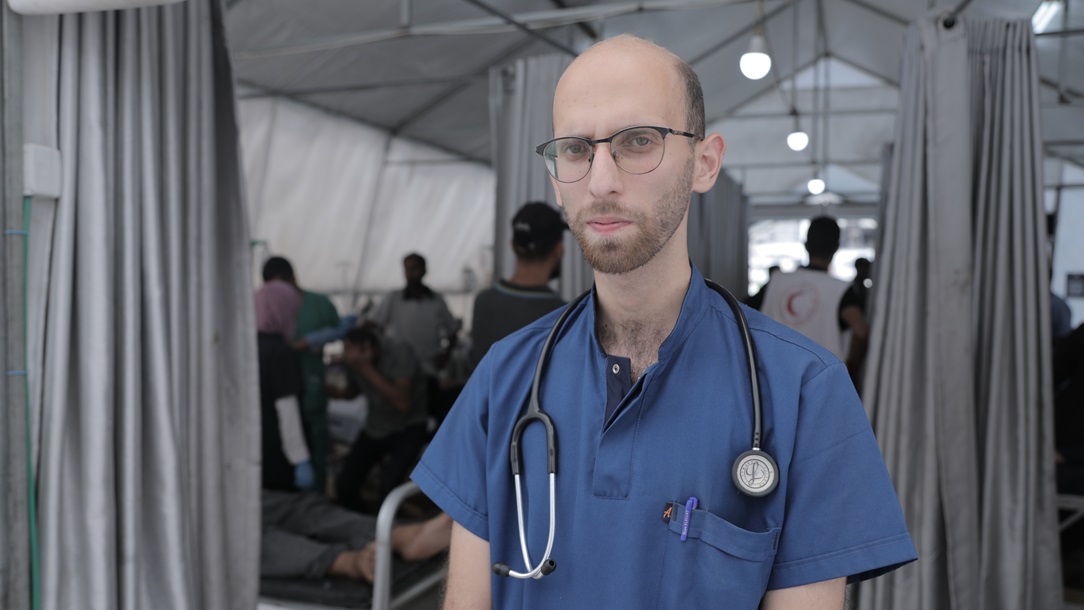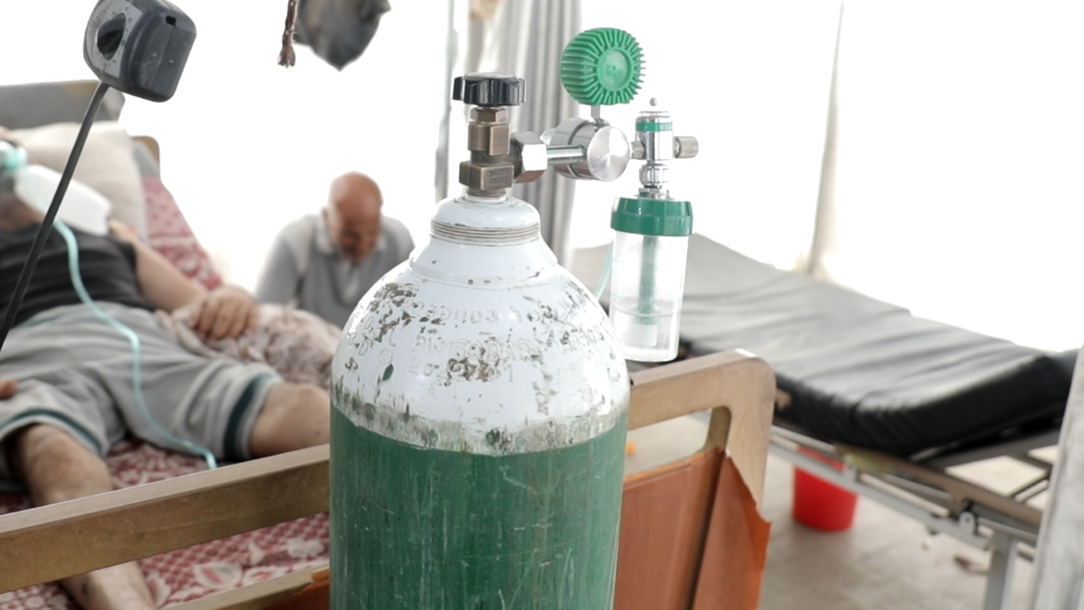Starvation looms as famine declared by IPC in parts of Gaza

A patient is comforted by a loved one whilst receiving treatment at the Palestine Red Crescent Society Al-Saraya field hospital in Gaza, July 2025
Last updated 23 August 2025
People in Gaza are living through a desperate humanitarian crisis. Hospitals have been destroyed and food and critical supplies are running out.
The IPC (the Integrated Food Security Phase Classification) declared famine in areas of Gaza, including Gaza City, on 22 August 2025. This is the latest in a series of dire warnings about the humanitarian situation on the ground.
Food insecurity has reached catastrophic levels in Gaza. More than 2 million people now face extreme levels of hunger and what little food is left available is now priced beyond the reach of most families.
- Find out more about the catastrophic humanitarian situation and how we're trying to help: What is happening in Gaza?
What is famine?
On 22 August 2025, the IPC declared a famine was occurring in parts of Gaza. Those areas are within the Gaza Governorate, a region which includes Gaza City.
The IPC defines famine as “a situation in which at least one in five households has an extreme lack of food and face starvation and destitution, resulting in extremely critical levels of acute malnutrition and death.”
Famine, also referred to by the IPC as ‘Phase 5’, is the highest phase of the IPC Acute Food Insecurity scale and represents the most serious condition.
The IPC is an international organisation which analyses data to conclude whether famine is happening or projected to occur in a country.

Emergency Physician, Dr. Alaa, at the Palestine Red Crescent Society Al-Saraya field hospital in Gaza, July 2025.
‘Catastrophic’ lack of supplies
Amid worsening conditions, mothers of patients and doctors at the Red Cross Al-Saraya field hospital in Gaza have shared their harrowing accounts as supplies run low and staff are stretched thin.
Dr Alaa Al-Sharif is an emergency physician at the Palestine Red Crescent Society Al-Saraya field hospital in Gaza City.
He said: “My job here is to receive patients daily, of all types. Most of the cases we receive here are injuries. We handle the cases, ensure they are stabilised, and then refer them to the appropriate place, either within the department or to the surgical unit.
“As for food, due to the lack of nutrition among the population, we receive many cases suffering from low blood pressure and low blood sugar. When they arrive at the emergency department, we give them sugar solutions. For the past two weeks or a month, we’ve also started experiencing shortages of these resources.
“The malnutrition cases we receive are usually among the elderly and adolescents, ranging from 50 to 100 cases per day. We only handle the most severe cases.
“Patients mainly need IV fluids containing water, salts, and sugar, that’s all we currently have.
“The food shortage causes exhaustion. Our shifts last for 24 continuous hours. During that time, the available food is not enough to provide us with the energy needed to care for all the patients.”

Supplies dwindle at the Palestine Red Crescent Society Al-Saraya field hospital in Gaza.
A mother’s plea: “Stop the war”
Fatema, 48, is the mother of Raed, a 26-year-old man whose leg was amputated and is receiving care at the field hospital in Gaza City.
Fatema explained how her son was injured: “My son went to get food for his children and us. He brought back a bag of rice, but it was taken from him by people we don't even want to describe.
“He went to the Nabulsi area to get us food because our situation was so bad, we had no food, no drink, nothing at all.
“There was nothing at home, so he said he would go get a bag of flour like the others. I told him not to go, maybe something might happen there.
“He insisted on going. He went to his fate. He pulled a bag of rice and tried to escape through the crowd, but he couldn't and fell to the ground. A truck tire ran over his leg.
“He needs supplements and food to improve his haemoglobin, but there is nothing. There is no money, no food, and no one to support his case. When I manage to get 100 or 200 shekels (10 shekels = £2.29). I go out to buy food, but it’s not enough for anything.
“A small bunch of grapes costs 40 shekels, three figs cost 30 shekels. This is a huge injustice. What can I do? He also has children aged four, three, and just two months. I can't find anything to feed them
“For three months, I have eaten nothing but one or two pieces of bread. When I get hungry, I drink water.”
“I hope the war ends, not just for me and my son, but for all the people suffering like us. We are tired of repeating the word ‘we're exhausted.’ For God’s sake, stop the bleeding in Gaza.
“It’s not just me saying this, every mother is saying, ‘For God’s sake, stop the war. Stop the war’.”
How you can help Gaza
The best way to help people in Gaza today is by donating to the Gaza Crisis Appeal.
We need your donations urgently to support the life-saving emergency response work of the Palestine Red Crescent Society and the ICRC in Gaza.
Gaza Crisis Appeal
Every donation helps us reach more people in Gaza with food, clean water, and medical support - your kindness today can change lives tomorrow.
Donate Now